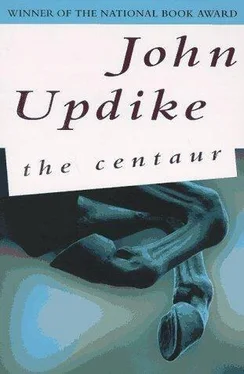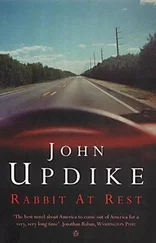John Updike - The Centaurus
Здесь есть возможность читать онлайн «John Updike - The Centaurus» весь текст электронной книги совершенно бесплатно (целиком полную версию без сокращений). В некоторых случаях можно слушать аудио, скачать через торрент в формате fb2 и присутствует краткое содержание. Жанр: Триллер, на английском языке. Описание произведения, (предисловие) а так же отзывы посетителей доступны на портале библиотеки ЛибКат.
- Название:The Centaurus
- Автор:
- Жанр:
- Год:неизвестен
- ISBN:нет данных
- Рейтинг книги:3 / 5. Голосов: 1
-
Избранное:Добавить в избранное
- Отзывы:
-
Ваша оценка:
- 60
- 1
- 2
- 3
- 4
- 5
The Centaurus: краткое содержание, описание и аннотация
Предлагаем к чтению аннотацию, описание, краткое содержание или предисловие (зависит от того, что написал сам автор книги «The Centaurus»). Если вы не нашли необходимую информацию о книге — напишите в комментариях, мы постараемся отыскать её.
In a small Pennsylvania town in the late 1940s, schoolteacher George Caldwell yearns to find some meaning in his life. Alone with his teenage son for three days in a blizzard, Caldwell sees his son grow and change as he himself begins to lost touch with his life. Interwoven with the myth of Chiron, the noblest centaur, and his own relationship to Prometheus, The Centaur one of John Updike's most brilliant and unusual novels.
The Centaurus — читать онлайн бесплатно полную книгу (весь текст) целиком
Ниже представлен текст книги, разбитый по страницам. Система сохранения места последней прочитанной страницы, позволяет с удобством читать онлайн бесплатно книгу «The Centaurus», без необходимости каждый раз заново искать на чём Вы остановились. Поставьте закладку, и сможете в любой момент перейти на страницу, на которой закончили чтение.
Интервал:
Закладка:
My father seemed to come into the room at this moment, so I must have fallen asleep. My lips felt swollen, my bare legs boneless and long. His great shadow cut across the strip of pink light that the lowered shade left standing along the wall by the corner. I heard him set my books down on our table. “You asleep, Peter?”
“No. Where have you been?”
“I called your mother and Al Hummel. Your mother tells me to tell you not to worry about anything, and Al’s going to send his truck in for the car in the morning. He thinks it sounds like the driveshaft and he’ll try to get second-hand parts for me.”
“How do you feel?”
“O.K. I was talking to an awfully nice gentleman down stairs in the lobby; he travels all over the East consulting with these big stores and companies about their advertising programs and clears twenty thousand a year with a two-month vacation. I told him that was the kind of creative work you were interested in and he said he’d like to meet you. I thought of coming up to get you but figured you could probably use the sleep.”
“Thanks,” I said. His shadow cut back and forth across the light as he took off his coat, his tie, his shirt.
His voice chuckled. “The hell with him, huh? I guess that’s the attitude to take. A man like that would walk over your dead body to grab a nickel. That’s the kind of bastard I’ve done business with all my life; they’re too smart for me.”
When he got into bed, after his body stopped rustling the sheets, there was a pause, and he said, “Don’t worry about your old man, Peter. In God we trust.”
“I’m not worried,” I said. “Good night.”
There was another pause, and then the darkness spoke: “Pleasant dreams, as Pop would say.” And his evoking my grandfather unexpectedly did make this strange room safe enough to sleep in, though a woman’s voice giggled down the hall, and doors kept slamming above and below us.
My sleep was simple and deep and my dreams scanty. When I awoke, all I remembered was being in an endless chemical laboratory, like a multiplication with mirrors of the basins and test tubes and Bunsen burners in Room 107 at Olinger High. There was on a table a small Mason jar such as my grandmother used to put up applesauce in. Its glass was clouded, I picked it up and put my ear to the lid and heard a tiny voice, as high in pitch as the voice that calls numbers in a hearing test, saying with a microscopic distinctness, “I want to die. I want to die.”
My father was already up and dressed. He stood by the window, its shade raised, and looked down at the city stirring itself into the gray morning. The sky was not clear; clouds like the undersides of long buns unrolled beyond the brick horizon of the city. He opened a window, to savor Alton, and the air tasted different from yesterday’s: milder, preparatory, stirred. Something had moved nearer.
Downstairs, our clerk had been replaced by a younger man, who stood straight and did not smile. “Has the old gentleman gone off duty?” my father asked.
“It’s a funny thing,” the new clerk said, without smiling at all. “Charlie died last night.”
“Huh? How could he do that?”
“I don’t know. It happened around two in the morning, they said. I wasn’t supposed to come on until eight. He just got up from the desk and went into the men’s room and died on the floor. Heart, it must have been. Didn’t the ambulance wake you?”
“Was that siren for my friend? I can’t believe what you’re saying. He was a wonderful Christian to us.”
“I didn’t know him very well myself.” The clerk accepted my father’s check only after a long explanation, and with a doubtful grimace.
My father and I scraped together the change in our pockets and found enough for breakfast at a diner. I had one dollar in my wallet but did not tell him, intending it to be a surprise when things got more desperate. The counter of the diner was lined with workmen soft-eyed and gruff from behind half-asleep still. I was relieved to see that the man working the griddle was not our hitchhiker. I ordered pancakes and bacon and it was the best breakfast I had had in months. My father ordered Wheaties, mushed the cereal into the milk, ate a few bites, and pushed it away. He looked at the clock. It said 7:25. He bit back a belch; his face whitened and the skin under his eyes seemed to sink against the socket bone. He saw me studying him in alarm and said, “I know. I look like the devil. I’ll shave in the boiler room over at school, Heller has a razor.” The pale grizzle, like a morning’s frost, of a day-old beard covered his cheeks and chin.
We left the diner and walked south toward the high dull owl of dead tubing. A tenuous winter mist, released by the rise in temperature, licked the damp cement and asphalt. We boarded a trolley at Fifth and Weiser. The interior was gay with the straw of the seats, and warm and nearly empty. Few other people were heading outwards against the pull of the city. Alton thinned; the row houses split like ice breaking; a distant hill was half tranced green and half new pastel houses; and after the long gliding stretch beyond the ice cream stand crowned by a great plaster replica of a cone, the motley brick houses of Olinger took hold around us. The school grounds and then the salmon-brick school appeared on the left; the boilerhouse smokestack admonished the sky like a steeple. We got out by Hummel’s Garage. Our Buick was not there yet. We were not late today; cars were still nosing into their slots. An orange bus racily heaved through a loop and swayed to a stop; students the size of birds, colored in bright patches, no two alike, tumbled from the doors in pairs.
As my father and I strode along the pavement that divided the school side lawn from Hummel’ss alley, a little whirlwind sprang up before us and led us along. Leaves long dead and brittle as old butterfly wings, an aqua candy wrapper, flecks and dust and seed-sized snips of gutter chaff all hurried in a rustling revolution under our eyes; a distinctly circular in visible presence outlined itself on the walk. It danced from one margin of grass to another and sighed its senseless word; my instinct was to halt but my father kept striding. His pants flapped, something sucked my ankles, I closed my eyes. When I looked behind us, the whirlwind was nowhere to be seen.
In the school we parted. A student, I was held by regulations to this side of the wire-reinforced doors. He pushed through and walked down the long hall, his head held high, his hair fluffed from the removal of his blue knit cap, his heels pounding the varnished boards. Smaller and smaller he grew along their perspective; at the far door he became a shadow, a moth, impaled on the light he pressed against.
The door yielded; he disappeared. With a grip of sweat, terror seized me.
V
GEORGE W. CALDWELL, TEACHER, 50.
Mr. Caldwell was born December 21st, 1896, on Staten Island, New York City. His father was the Reverend John Wesley Caldwell, a graduate-of Princeton University and the Union Theological Seminary, New York. Upon graduation from the latter place he entered the Presbyterian minis try, making his the fifth generation of clergymen supplied by the Caldwell family to this denomination. His wife, nee Phyllis Harthorne, was of Southern extraction, hailing from the near environs of Nashville, Tennessee. To their marriage she not only brought her great personal beauty and charm but the energetic piety characteristic of Southern gentlewomen. Countless parishioners were to stand indebted to her example of devotion and Christian testimony; when, at the tragically early age of forty-nine, her husband was called to move “from strength to strength” in the Higher Service, it was she who, in the difficult year of his lingering illness, carried on the work of the church, on several Sundays herself mounting into the pulpit.
Читать дальшеИнтервал:
Закладка:
Похожие книги на «The Centaurus»
Представляем Вашему вниманию похожие книги на «The Centaurus» списком для выбора. Мы отобрали схожую по названию и смыслу литературу в надежде предоставить читателям больше вариантов отыскать новые, интересные, ещё непрочитанные произведения.
Обсуждение, отзывы о книге «The Centaurus» и просто собственные мнения читателей. Оставьте ваши комментарии, напишите, что Вы думаете о произведении, его смысле или главных героях. Укажите что конкретно понравилось, а что нет, и почему Вы так считаете.












